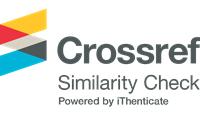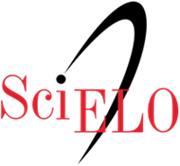Reproductive parameters and weight gain of roosters fed with waste oil from olive culture
Abstract
Waste oil from olive oil extraction industry was used, instead of soybean oil, in heavy roosters’ diet in order to evaluate birds’ reproductive parameters. A total of forty roosters were housed individually in boxes with 1.2 m². Two experimental diets were used: control diet, based on corn, soybean meal, and soybean oil; and test diet, where soybean oil was totally replaced by waste oil. In order to verify weight gain and feed intake, animals were individually weighed weekly. Seven semen collections were performed with fifteen-day interval. Reproductive variables analyzed sperm volume, motility, concentration, and morphology. No statistical difference (p > 0.05) was observed between treatments at the different collection periods for the variables sperm volume, motility, and concentration. There was a statistically significant difference between treatments for body weight in periods three (p = 0.04), and seven (p = 0.04). Statistical differences (p = 0.01) were also observed between treatments for abnormal sperm morphology. Among collection periods, statistical difference was observed for motility (p = 0.00), and sperm concentration (p = 0.01). Total replacement of soybean oil by waste oil from olive oil extraction in young heavy roosters’ diets does not affect sperm volume, motility, and concentration; reduces defects in sperm tail, and promotes better weight gain control.
Downloads
References
Al-ani, N. K. H. (2013). Protective influence of olive oil on reproductive parameters in male rat treated with cadmium. Global Journal of Bio-Science and Biotechnology, 2(4), 500-505.
Alqaisi, O., Ndambi, O.A. & Williams, R.B. (2017). Time series livestock diet optimization: cost-effective broiler feed substitution using the commodity price spread approach. Agricultural and and Food Economics, 5(25). DOI: https://doi.org/10.1186/s40100-017-0094-9
An-im, N., Kirkwood, M., Techakumphu, M., & Tantasuparuk, W. (2011). Lipid profiles of sperm and seminal plasma from boars having normal or low sperm motility. Theriogenology, 75(5), 897-903. DOI: https://doi.org/10.1016/j.theriogenology.2010.10.032
Banihani, S. A. (2017). Semen quality as affected by olive oil. International Journal of Food Properties, 20(2), 1901-1906. DOI: https://doi.org/10.1080/10942912.2017.1357044
Bongalhardo, D., Dionello, N. J., Cardellino, R. A., & Braccini Neto, J. (1994). Repetibilidade e correlações fenotípicas do caráter volume de sêmen de galos Withe Leghorn. Revista da Sociedade Brasileira de Zootecnia, 23(6), 1002-1007. DOI: https://doi.org/10.1590/S1516-35982000000500009
Bongalhardo, D. C. (2013). Production and preservation of rooster semen. Revista Brasileira de Reprodução Animal, 37(2), 131-135.
Bootwalla, S. M., & Miles, R. D. (1992). Development of diluents for domestic fowl semen. World's Poultry Science Journal, 48(2), 121-128. DOI: https://doi.org/10.1079/WPS19920012
Borges, C. A. Q., Rostagno, H. S., Silva, J. H. V., Albino, L. F. T., Torres, C. A. A., Jordão Filho, J., & Ribeiro, M. L. G. (2006). Protein requirements and carcass composition of male broiler breeders from 27 to 61 weeks. Revista da Sociedade Brasileira de Zootecnia, 35(5), 1971-1977. DOI: https://doi.org/10.1590/S1516-35982006000700013
Burrows, W. H., & Quinn, J. P. (1937). The collection of spermatozoa from the domestic fowl and turkey. Poultry Science, 16(1), 19-24. DOI: https://doi.org/10.3382/ps.0160019
Cardoso, T. F., Varela Junior, A. S., Silva, E. F., Vilela, J., Hartmann, A., Jardim, R. D., ... Corcini, C. (2014). Influence of mineral, olive or sunflower oils on male reproductive parameters in vitro – the wild rodent Calomys laucha. Andrologia, 46(7), 722-725. DOI: https://doi.org/10.1111/and.12138
Cioffi, G., Pesca, M. S., Caprariis, P., Braca, A., Severino, L., & Tommasi, N. (2010). Phenolic compounds in olive oil and olive pomace from Cilento (Campania, Italy) and their antioxidant activity. Food Chemistry, 121(1), 105-111. DOI: https://doi.org/10.1016/j.foodchem.2009.12.013
D’amato, R., Proietti, P., Nasini, L., Del Buono, D., Tedeschini, E., & Businelli, D. (2014). Increase in the selenium content of extra virgin olive oil: quantitative and qualitative implications. Grasas & Aceites, 65(2), 1-9. DOI: https://doi.org/10.3989/gya.097313
Daramola, J. O., Adekunle, E. O., Onagbesan, O. M., Oke, O. E., Ladokun, A. O., Abiona, J. A., … Adeleke, M. A. (2016). Protective effects of fruit-juices on sperm viability of West African Dwarf goat bucks during cryopreservation. Animal Reproduction, 13(1), 7-13. DOI: https://doi.org/10.4322/1984-3143-AR726
Dermeche, S., Nadour, M., Larroche, C., Moulti-mati, F., & Michaud, P. (2013). Olive mill wastes: Biochemical characterizations and valorization strategies. Process Biochemistry, 48(10), 1532-1552. DOI: https://doi.org/10.1016/j.procbio.2013.07.010
Djermanovic, V., Mitrovic, S., & Djekic, V. (2013). Rooster body weight influence on the reproductive performance of the broilerparents. Biotechnology in Animal Husbandry, 29(1), 83-91. DOI: https://doi.org/10.2298/BAH1301083D
El-kholy, T. A. F., Al-abbadi, H. A., Qahwaji, D., Al-ghamdi, A. K., Shelat, V. G., Sobhy, H. M., & Hilal, M. A. (2015). Ameliorating effect of olive oil on fertility of male rats fed on genetically modified soya bean. Food & Nutrition Research, 59(1), 1-6. DOI: https://doi.org/10.3402/fnr.v59.27758
Feng, Y., Ding, Y., Liu, J., Tian, Y., Yang, Y., Guan, S., & Zhang, C. (2015). Effects of dietary omega-3/omega-6 fatty acid ratios on reproduction in the young breeder rooster. BMC Veterinary Research, 11(73), 1-7. DOI: https://doi.org/10.1186/s12917-015-0394-9
Garrido, M., Gonzáles-flores, D., Marchena, A. M., Prior, E., García-Parra, J., Barriga, C., & Moratinos, A. B. R. (2012). A lycopene-enriched virgin olive oil enhances antioxidant status in humans. Journal of the Science of Food and Agriculture, 93(8), 1820-1826. DOI: https://doi.org/10.1002/jsfa.5972
Hall, P. F., Irby, D. C., & Kretser, D. M. (1969). Conversion of cholesterol to androgens by rat tests: Comparison of interstitial cells and seminiferous tubules. Endocrinology, 84(3), 488-496. DOI: https://doi.org/10.1210/endo-84-3-488
Hocking, P. P., & Bernard, R. (2000). Effects of the age of male and female broiler breeders on sexual behaviour, fertility and hatchability of eggs. British Poultry Science, 41(3), 370-388. DOI: https://doi.org/10.1080/713654925
Kacel, A., & Iguer-ouada, M. (2018). Effects of olive oil dietary supplementation on sperm quality and seminal biochemical parameters in rooster. Journal of Animal Physiology and Animal Nutrition, 102(6), 1608-1614. DOI: https://doi.org/10.1111/jpn.12983
Karaca, A. G., Parker, H. M., & Mcdaniel, C. D. (2002). Elevated body temperature directly contributes to heat stress infertility of broiler breeder males. Poultry Science, 81(12), 1892-1897. DOI: https://doi.org/10.1093/ps/81.12.1892
Khdair, A. I., Abu-rumman, G., & Khdair, S. I. (2019). Pollution estimation from olive mills wastewater in Jordan. Heliyon, 5(8), 1-6. DOI: https://doi.org/10.1016/j.heliyon.2019.e02386
Lancellotti, T. E. S., Boarelli, P. V., Romero, A. A., Funes, A. K., Cid-Barria, M., Cabrillana, M. E., ... Fornés, M. W. (2013). Semen quality and sperm function loss by hypercholesterolemic diet was recovered by addition of olive oil to diet in rabbit. Plos One, 8(1), 1-8. DOI: https://doi.org/10.1371/journal.pone.0052386
Lara, L. J. C. (2015). Reprodução nas aves: desafios do manejo e da nutrição. Revista Brasileira de Reprodução Animal, 39(1), 85-90.
Lara, L. J., & Rostagno, M. A. (2013). Impact of heat stress on poultry production. Animals, 3(2), 356-369. DOI: https://doi.org/10.3390/ani3020356
Malik, A., Haron, A. W., Yusoff, R., Nesa, M., Bukar, M., & Kasin, A. (2013). Evaluation of the ejaculate quality of the red jungle fowl, domestic chicken and bantam chicken in Malaysia. Turkish Journal of Veterinary and Animal Science, 37(5), 564-568. DOI: https://doi.org/10.3906/vet-1107-26
Mangiagalli, M. G., Martino, P. A., Smajlovic, T., Cavalchini, L. G., & Marelli, S. P. (2010). Effect of lycopene on semen quality, fertility and native immunity of broiler breeder. British Poultry Science, 51(1), 152-157. DOI: https://doi.org/10.1080/00071660903401540
Mendoza, M. F., Gordillo, C. M., Expósito, J. M., Casas, J. S., Cano, M. M., Vertedor, D. M., & Baltasar, M. N. F. (2013). Chemical composition of virgin olive oils according to the ripening in olives. Food Chemistry, 141(3), 2575-2581. DOI: http://dx.doi.org/10.1016/j.foodchem.2013.05.074
Moyle, J. R., Yoho, D. E., Whipple, S. M., Donoghue, A. M., & Bramwell, R. K. (2012). Sperm production and testicular development of broiler breeder males reared on shortened growth cycles. Journal of Applied Poultry Research, 21(1), 88-94. DOI: https://doi.org/10.3382/japr.2011-00363
Nunes, H., Zanine, A. M., Machado, T. M. M., & Carvalho, F. C. (2007). Foods Alternative in diet of sheep. Archivos Latinoamericanos de Producción Animal, 15(4), 141-151.
Rosa, A. P., Stefanello, C., & Ferrufino, R. (2012). Influence of total or partial withdrawal of the crest on the reproductive status of broiler males. Revista Portuguesa de Ciências Veterinárias, 107(581-582), 63-68.
Sadamade, A., Oyedepo, T. A., & Bolaji, O. S. (2013). Fatty acids composition of three different vegetable oils (soybean oil, groundnut oil and coconut oil) by high performance liquid chromatography. Chemistry and Materials Research, 3(7), 26-29.
Silva, S. V., & Guerra, M. M. P. (2011). Cryopreservation effects on sperm cells and alternatives for crioinjury reduction. Revista Brasileira de Reprodução Animal, 35(4), 370-384.
Silveira, M. M., Freitas, A. G., Moraes, C. A., Gomes, S. F., Litz, S. H., Martins, J. M. S., ... Fernandes, E. A. (2014). Feeding management strategy for male broiler breeders and its effects on body weight, hatchability and fertility. Brazilian Journal of Poultry Science, 16(4), 397-402. DOI: http://dx.doi.org/10.1590/1516-635x1604397-402
Simonato, B., Trevisan, S., Tolve, R., Favati, F., & Pasini, G. (2019). Pasta fortification with olive pomace: Effects on the technological characteristics and nutritional properties. LWT - Food Science and Technology, 114(8), 1-6. DOI: https://doi.org/10.1016/j.lwt.2019.108368
Tinôco, I. F. F. (2001). Industrial aviculture: New concepts of materials, conceptions and constructive techniques available for Brazilian poultry houses. Revista Brasileira de Ciências Avícolas, 3(1), 1-26. DOI: https://doi.org/10.1590/S1516-635X2001000100001
Triques, G. E., Schimidt, J. M., Oro, C. S., Bordignon, H. F., Donin, D. G., & Fernandes, J. I. M. (2016). Effect of dietary antioxidant supplementation on reproductive characteristics of male broiler breeders during the post-peak production phase. Semina: Ciências Agrárias, 37(4), 2557-2566. DOI: https://doi.org/10.5433/1679-0359.2016v37n4Supl1p2557
Wedyan, M., Abu Hanieh, B., Al Harasheh, A., & Altawaha, A. R. (2017). Chemical characterization of olive pomace in the northern region of Jordan. Bulgarian Journal of Agricultural Science, 23(5), 866-872. DOI: https://doi.org/10.20944/preprints201703.0150.v1
Wilson, J. L., Krista, L. M., Mcdaniel, G. R., & Sutton, C. D. (1988). Correlation of broiler breeder male semen production and tests morphology. Poultry Science, 67(4), 660-668. DOI: https://doi.org/10.3382/ps.0670660
Zambiazi, R. C., Przybylski, R., Zambiazi, M. W., & Mendonça, C. B. (2007). Fatty acid composition of vegetable oils and fat. B. CEPPA Digital Library of Journals, 25(1), 111-120. DOI: http://dx.doi.org/10.5380/cep.v25i1.8399
Zhang, Z. F., Zhou, T. X., & Kim, I. H. (2013). Effects of dietary olive oil on growth performance, carcass parameters, serum characteristics, and fatty acid composition of breast and drumstick meat in broilers. Asian-Australasian Journal of Animal Sciences, 26(3), 416-422. DOI: https://doi.org/10.5713/ajas.2012.12486
Zhang, S., Su, H., Zhou, Y., Li, X., Feng, J., & Zhang, M. (2016). Effects of sustained cold and heat stress on energy intake, growth and mitochondrial function of broiler chickens. Journal of Integrative Agriculture, 15(10), 2336-2342. DOI: https://doi.org/10.1016/S2095-3119(15)61314-4
DECLARATION OF ORIGINALITY AND COPYRIGHTS
- I Declare that current article is original and has not been submitted for publication, in part or in whole, to any other national or international journal.
The copyrights belong exclusively to the authors. Published content is licensed under Creative Commons Attribution 4.0 (CC BY 4.0) guidelines, which allows sharing (copy and distribution of the material in any medium or format) and adaptation (remix, transform, and build upon the material) for any purpose, even commercially, under the terms of attribution.
Read this link for further information on how to use CC BY 4.0 properly.








































